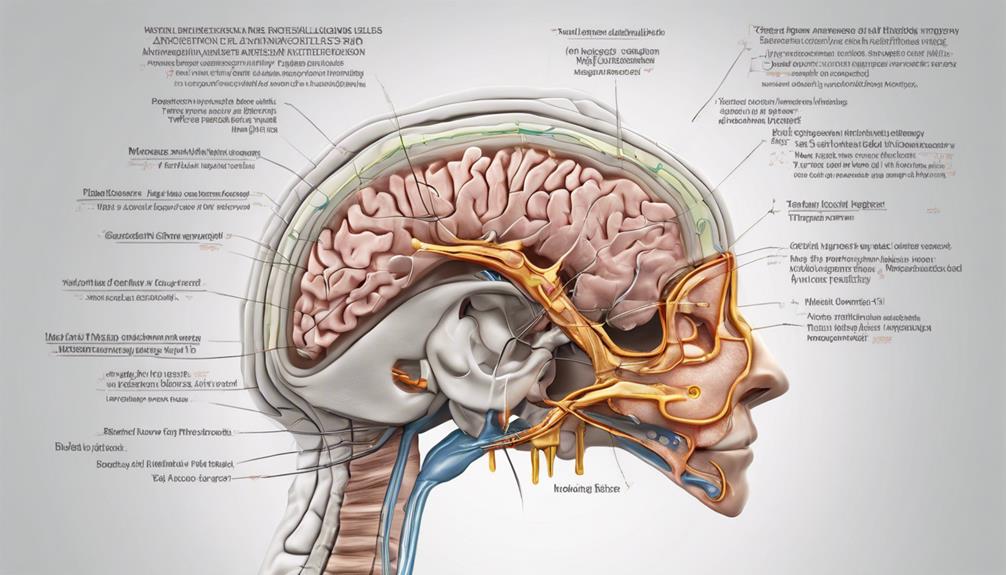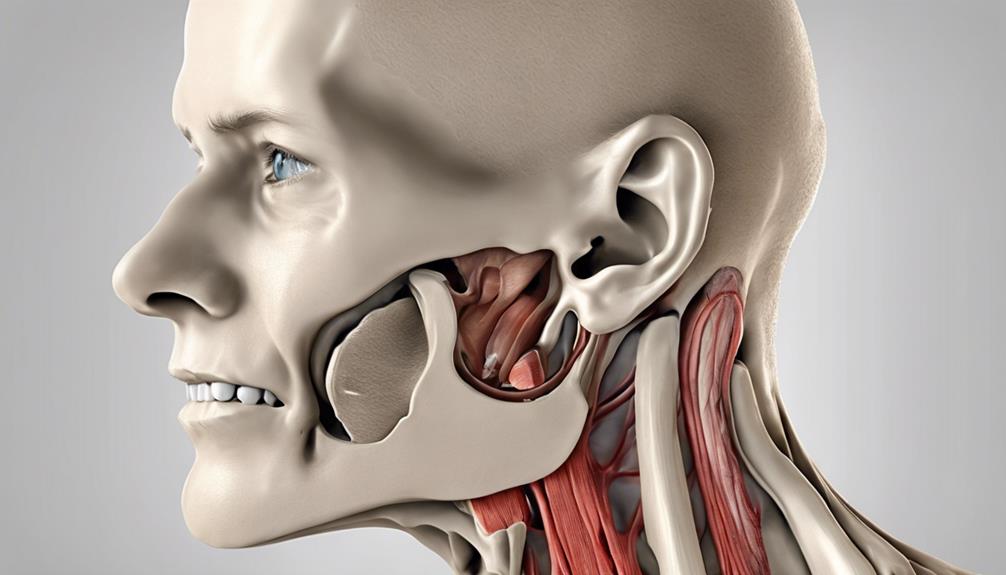Exploring the intricate ways in which meningitis impacts hearing loss reveals a subtle yet impactful interaction, underscoring its importance in affecting hearing abilities.
The intricate web of mechanisms through which meningitis disrupts the delicate harmony of our hearing apparatus is both fascinating and daunting. Understanding these intricate connections could shed light on potential avenues for intervention and management, offering a glimpse into the intricate dance between infection and sensory perception.
Key Takeaways
- Meningitis damages cochlea and auditory nerve, leading to sensorineural deafness.
- Inflammation in inner ear structures causes hearing loss by harming cochlear hair cells.
- Diagnostic tests like tympanometry and otoacoustic emissions help assess hearing impairment.
- Treatment options include hearing aids, cochlear implants, and speech therapy for communication skills.
Mechanisms of Meningitis-Induced Hearing Loss
When meningitis infects the body, it initiates a chain of events that can result in significant damage to the cochlea and auditory nerve, ultimately leading to sensorineural deafness. Meningitis-induced hearing loss primarily stems from the inflammation and damage caused to the inner ear structures responsible for sound signal transmission. The cochlea, a vital component of the inner ear, can suffer from infections and inflammation due to meningitis, leading to inner ear nerve damage and subsequent hearing impairment.
In cases of meningitis, the bacterial toxins and inflammatory response can harm the delicate cochlear hair cells, crucial for converting sound vibrations into electrical signals that the brain can interpret. This damage can range from mild to profound, affecting the ability to perceive various frequencies of sound. Sensorineural deafness in meningitis often results from cochlear infection or inflammation of the auditory nerve, disrupting the transmission of sound signals to the brain. Understanding these mechanisms is essential in comprehending the complexities of hearing loss associated with meningitis.
Types of Hearing Impairment in Meningitis

Types of hearing impairment in meningitis encompass primarily sensorineural deafness, which results from damage to inner ear structures such as the cochlear hair cells and auditory nerve. This type of hearing loss is characterized by its lasting effects and can range from mild to profound, significantly impacting the hearing abilities of meningitis survivors.
On the other hand, conductive hearing loss, although less common in meningitis-related cases, can also occur but to a lesser extent compared to sensorineural deafness.
- Sensorineural Hearing Loss: Damage to the cochlear hair cells and auditory nerve post-meningitis can lead to sensorineural deafness, impacting the inner ear structures crucial for sound perception.
- Lasting Effects: Inner ear inflammation and exposure to bacterial toxins can cause enduring damage, resulting in long-term sensorineural deafness with varying degrees of severity.
- Impact on Hearing Abilities: Meningitis survivors may experience a broad spectrum of sensorineural hearing loss, from mild impairments to profound deafness, influencing their overall hearing capabilities.
Diagnostic Tests for Meningitis-Related Hearing Loss
What diagnostic tests are commonly used to assess meningitis-related hearing loss?
When evaluating individuals for meningitis-associated hearing issues, a range of diagnostic tests are employed to provide a comprehensive assessment. These tests include tympanometry, which measures the movement of the eardrum and middle ear pressure, otoacoustic emissions to evaluate the function of the cochlea, and auditory brainstem response (ABR) tests to assess the auditory nerve and brainstem pathways.
Behavioral tests such as Behavioral Observation Audiometry (BOA), Visual Reinforcement Audiometry (VRA), and Conditioned Play Audiometry (CPA) are utilized for different age groups to evaluate hearing abilities. Additionally, auditory function tests like pure-tone testing and bone conduction testing help measure hearing sensitivity and ear function.
In cases where cochlear ossification is suspected, imaging tests such as MRI or CT scans may be recommended. Regular post-infection hearing tests are crucial for individuals who've had meningitis to monitor any potential hearing loss and implement appropriate interventions.
Treatment Options for Meningitis-Associated Hearing Issues

Effective management of meningitis-associated hearing issues often involves utilizing a combination of hearing aids, cochlear implants, speech therapy, and regular monitoring to ensure optimal outcomes for individuals. When addressing hearing problems associated with meningitis, it's crucial to consider the following:
- Hearing Aids: These devices, such as in-the-ear or behind-the-ear aids, are effective in managing most cases of hearing loss resulting from meningitis.
- Cochlear Implants: Severe sensorineural hearing loss following meningitis may require cochlear implants for enhanced quality of life and auditory function.
- Speech Therapy and Auditory-Verbal Therapy: These supportive options play a vital role in managing hearing loss post-meningitis, aiding individuals in developing communication skills.
Furthermore, vaccination against bacterial meningitis is essential for preventing associated hearing loss, particularly in children. Regular monitoring and follow-up testing post-meningitis diagnosis are also critical for assessing and effectively managing any arising hearing issues.
Strategies for Preventing Hearing Loss in Meningitis
Collaborating with healthcare providers, audiologists, and support organizations enhances our approach to preventing hearing loss in individuals affected by bacterial meningitis. Vaccination against common meningitis pathogens such as Streptococcus pneumoniae and Neisseria meningitidis is pivotal in warding off hearing loss following infection. Early diagnosis and immediate treatment of meningitis play a crucial role in diminishing the risk of hearing impairment. Regular monitoring and conducting follow-up hearing tests post-meningitis aid in the early identification and management of any potential hearing loss. For mild to moderate hearing loss, utilizing hearing aids can be beneficial, whereas considering cochlear implants for severe cases can significantly enhance outcomes. The table below summarizes key strategies for preventing hearing loss in individuals with meningitis:
| Prevention Strategies | Description | Importance |
|---|---|---|
| Vaccination | Protects against meningitis pathogens | Essential for prevention |
| Early Diagnosis | Prompt identification of meningitis | Reduces risk of hearing loss |
| Monitoring | Regular post-meningitis follow-ups | Early detection of hearing loss |
Frequently Asked Questions
Can Meningitis Cause Auditory Processing Disorder?
Yes, meningitis can cause auditory processing disorder (APD) by damaging auditory structures in the brain and inner ear. This damage can lead to difficulties in processing auditory information, affecting language, communication, and learning. Individuals who've had meningitis may exhibit symptoms of APD, such as struggles in noisy environments, misinterpretation of spoken language, and poor listening skills.
Treatment involves comprehensive assessments, speech therapy, and educational support to improve communication abilities.
What Ear Structures Are Affected by Bacterial Meningitis?
We've got to talk about the impact of bacterial meningitis on our ear structures.
This infection isn't playing nice with our cochlea and auditory nerve. The cochlea, responsible for hearing, and the auditory nerve, transmitting sound to the brain, take a hit.
Damage to cochlear hair cells disrupts sound conversion, while inflammation messes with signal transmission, causing hearing loss.
Bacterial meningitis is like a wrecking ball to our precious inner ear components!
Can Meningitis Cause Blindness and Deafness?
Yes, meningitis can cause blindness and deafness. While blindness is a rare complication, sensorineural deafness is more common due to damage in the inner ear or auditory nerve. Permanent hearing loss can occur from cochlear hair cell and auditory structure damage.
Inflammatory responses and bacterial toxins contribute to this damage. Up to 30% of bacterial meningitis survivors may experience hearing loss as a result of the infection.
What Are the Symptoms of Meningitis in the Ear?
We've seen cases where meningitis causes sensorineural deafness, tinnitus, and balance issues. This can lead to varying degrees of hearing loss, affecting one or both ears.
Infections in the inner ear structures post-meningitis can result in permanent hearing impairment. Additionally, inflammation in the semicircular canals due to meningitis can cause balance problems and dizziness.
Tinnitus, like ringing or buzzing sounds, may also develop from meningitis impacting the auditory nerves.
Conclusion
In conclusion, meningitis is like a sneaky ninja that can steal your hearing without you even realizing it!
But fear not, with early detection, monitoring, and appropriate intervention, we can kick meningitis to the curb and protect our precious sense of hearing.
Remember, prevention is key, so stay vigilant and keep those ears safe from the meningitis menace!










